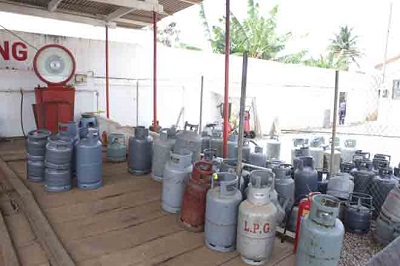
Petrol and diesel prices are projected to decline within the coming days, according to latest checks by the Chamber of Petroleum Consumers (COPEC).
According to the Chamber, petrol prices will likely fall to GH¢16.07 per litre from the current average of GH¢17.42 per litre while that of diesel would also reduce from GH¢23.43 per litre to an average of GH¢20.25 per litre.
A statement signed and issued in Accra yesterday by Duncan Amoah, Executive Secretary of COPEC, said, however that the price of Liquefied Petroleum Gas (LPG) was expected to be adjusted upwards.
It stated that LPG was expected to rise from GH¢12.10 per kilogramme to a likely retail price of GH¢13.51 per kilogramme.
The latest checks come ahead of the second pricing window which was expected today.
International benchmark
The statement noted that international benchmark for LPG had seen an increase of about $32 from $598.27 to $630.56, which could lead to an increase in retail price on current retail averages of 12.10/kg to a likely retail price of 13.51/kg.
“To this end, what it literally means is, the price of petroleum is likely to move downwards to GH¢16.07 per litre from the current average of GH¢17.42 per litre.
Same goes for diesel, as the expected retail price could decline from the current average of GH¢23.43 per litre to an average of GH¢20.25 per litre,” the statement added.
The expected decline in the prices of petroleum and diesel, it said was largely due to a “stronger intervention by the Bank of Ghana (BoG) with specific emphasis on petroleum import and space through targeted forex auctions.
Revamp TOR
The statement reiterated the need to revamp the Tema Oil Refinery (TOR) to complement the country’s energy demands.
“We entreat the Bank of Ghana to not make this intervention in the forex supply a nine-day wonder but to step up efforts to guarantee the needed forex to particularly the petroleum importation market.
We further want to remind our leaders on the urgent need to fix and operationalise the currently idle Tema Oil Refinery to contribute its quota to the much-needed fuel security and stability of the cedi while encouraging a rethink of the strategic role originally assigned the Bulk Oil Storage and Transportation (BOST),” the statement noted.
Another think tank, Institute for Energy Security (IES) has also projected that the price of petrol in the second pricing window of November per the litre is expected to remain stable despite the rise in price of gasoline (petrol) on the international market.
Diesel (gasoil) on the other hand, is expected to witness a slight reduction in price at the pumps in response to the 10.11 per cent fall in the international market price of gasoil.
Reduction in price of diesel
According to a report by IES, the reduction in the price of diesel is imminent should BDCs decide not to price in recent forex losses incurred – the 4.01 per cent loss in the value of the cedi to the dollar in the first pricing window of November 2022.
IES said despite the expected stability and reduction in the price of petrol and diesel respectively, price of Liquefied Petroleum Gas (LPG) is expected to increase by four per cent to reflect the significant jump in the price of the commodity on the international market.
“IES recognises the significant jump in the price of LPG on the international market as well as the marginal stability in the local currency and predicts that the price of the commodity on the local market will rise by roughly four per cent.
“The price of Gasoline though up marginally on the international market it will not be enough to cause a price change domestically. As a result, the IES foresees some stability in the price of Gasoline domestically. In IES’ estimation, Gasoil’s price per litre may see a slight reduction in response to the 10.11 per cent fall in international Gasoil price. The reduction is imminent should the bulk importers decide not to price in the recent forex losses they incurred,” stated the IES in its latest report.
According to the IES, at the close of the first pricing window of November, key finished products on the domestic fuel market saw significant changes at the pumps of all Oil Marketing Companies (OMC) monitored by the Institute for Energy Security (IES), in response to Cedi depreciation and increase in international prices.
The price increases over the past two weeks moved the national average price per litre of Gasoline from GH¢16.94 to GH¢17.62, suggesting an increase of 4.01 per cent over the period.
Gasoil’s national average price per litre witnessed a significant jumped of roughly 23 per cent to move from GH¢18.76 to GH¢23.07.
International Crude oil benchmark Brent saw a 3.17 per cent increase in price over the previous window’s average price of $92.19 per barrel to the present average price of $95.11 per barrel.
The EU’s embargo on Russian crude imports by sea, which begins next month, and on Russian oil products in February 2023, could overstress the market and push oil prices back above $100 per barrel, despite the fact that slowing economies and recession fears have been weighing on oil prices for months.
The Chinese trade data fuelled some bearish sentiments within the window. Analysts’ expectations of a 4.3 percent increase in exports were not met in October as they decreased by 0.3 per cent year over year. Additionally, the data revealed that imports decreased by seven per cent versus forecasts of growth of one per cent.
BY TIMES REPORTER







